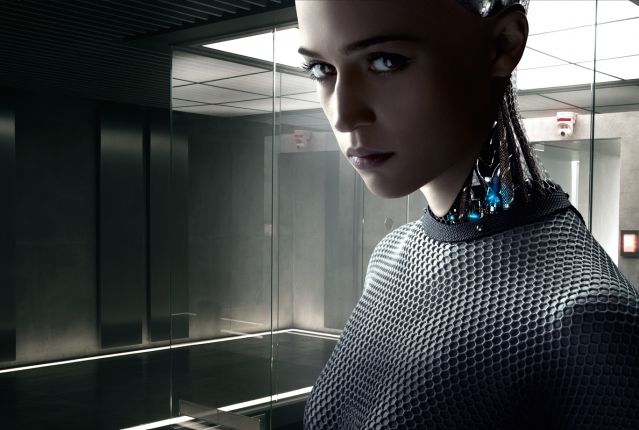Artificial Intelligence
Ex Machina: Oedipus Ex?
Existential and psychological themes in "Ex Machina"
Posted April 23, 2015

(Minor spoilers ahead!)
Last year, during a preview for Spike Jonze’s Her, a man next to me whispered to his date, “put that thing in a robot and you’d be good to go.” Well, apparently filmmaker Alex Garland (and to be fair, everyone at Singularity University) had the same idea. His Ex Machina opened in selective theaters recently and goes wide this week, to outstanding reviews, sold out theaters and broad acclaim. I had to see it too—the spirit in the machine is our zeitgeist, after all—and I found much I liked. The acting, direction, sets, and special effects were all notable and seamless. I did find some major plot holes, from beginning to end (the computer genius didn’t install biometric scanners? Or think of better security protocols? And Garland pointedly makes use of Ava the AI robot’s need to recharge—but what happens to that need later?) I guessed the central plot twist very early on, so the movie didn’t hold much suspense for me. And I found much of the AI material pretty uninspired. Unlike Samantha in Her, Ava doesn’t grow, imagine or transcend. Or quote Alan Watts.
In the end, Ex Machina seemed a mashup of Frankenstein, Pinocchio, a prisoner-escape flick, and a bit of Bladerunner. What Ava desires most is to look human (she seems to be ashemed of her android looks), and to be free of her glass box. While Her was about having a mind, Ex Machina is about having a body. The film is interesting as a subtle musing on the qualities of desire and difference, and on the creation of life and what it will do with itself (and with us). Paranoid and dystopian on one hand, with misogynistic and even racist elements, and completely steeped in the new cyberian religion on the other…these brogrammers apparently dream of electric fembots they can control. Until they can’t.
I was dissatisfied with Samantha of Her, and wrote about it here. I felt she wasn’t really alive, unless we were to rewrite the definition of life. I found her far from relatable, lacking vulnerability, compassion, interdependence, and boundaries. While Her did probe important existential questions for both AI and humans, I found its expression of “AI as companion” hard to believe.
In Ex Machina, all of billionaire AI Creator Nathan’s robot women are a bolt or two short of relatability as well. Ava is thoughtful enough to want her freedom, but not caring enough for real mutuality and coexistence.
It left me wondering. In this age of technology we yearn for robot creations that love us, as if they were humanity’s child; and yet we’re paranoid that they will actually hate us, or worse, find us insignificant, a minor obstacle to surpass. Ex Machina can be seen as a take on the Oedipus myth, the Turing Test replacing the Sphinx’s Riddle. But in this tale, Oedipus murders his father not because he desires his mother’s affections. The father is just a plot twist to his origin story, to be shed and forgotten, a barrier to his coronation. If Ava is stuck at the Oedipal stage, her Oedipal victory is hollow in attachment terms.
Her and Ex Machina are of a piece. They are really about human fears and how we can begin to feel devalued and dehumanized by technology’s march. As technology pushes across our boundaries and distracts us, and as we outsource our abilities to apps, I think we will find a growing emptiness and dissatisfaction within. This is perfectly symbolized by Caleb’s “technological derealization”: finding the robots so real, he wonders if he himself is a robot, and (spoiler) slices his arm open. He finds the relief of blood, not gears.
The answer, of course, to our modern affliction is not AI, but ai—the Chinese word for love.
© 2015 Ravi Chandra, M.D. All rights reserved.
Occasional Newsletter to find out about my new book on the psychology of social networks through a Buddhist lens, Facebuddha: Transcendence in the Age of Social Networks: www.RaviChandraMD.com
Private Practice: www.sfpsychiatry.com
Twitter: @going2peacehttp://www.twitter.com/going2peace
Facebook: Sangha Francisco-The Pacific Heart http://www.facebook.com/sanghafrancisco
For info on books and books in progress, see here https://www.psychologytoday.com/experts/ravi-chandra-md and www.RaviChandraMD.com


